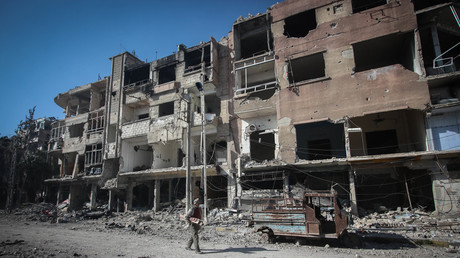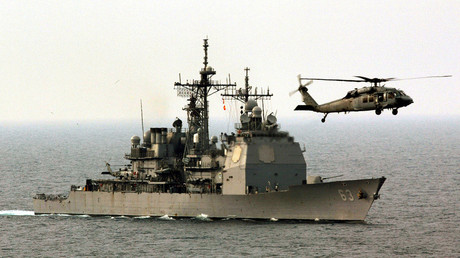US chose neocolonial course in Syria to gain control over its resources – Russian envoy to UN

Washington pursues a “neocolonial” policy aimed at dividing Syria and ultimately seizing its resources, the Russian ambassador to the United Nations Vassily Nebenzia said during a special UN Security Council (UNSC) meeting.
The US “continues its inherently neocolonial course aimed at division of [Syria]” as the US-led coalition supports the establishment of some “loyal governmental substitutes,” Nebenzia said during the UNSC session on Tuesday, as he slammed Washingtons actions in the war-torn Middle Eastern country.
Read more
He also drew attention to the fact that the coalition consistently expands its presence in Syria by building new bases and strengthening its forces.
“It is becoming clear that [the US-led coalition] attempts to take hold of the Syrian territory and gain control over its resources,” the Russian diplomat said during the urgent UNSC session, convened at Russias request to discuss the situation in Syrias Idlib province. Located in Syrias northwest, this region is the only one still mostly controlled by various militant groups, including some terrorist organizations such as Al-Nusra (now known as Hayat Tahrir al-Sham).
Earlier on Tuesday, the head of the US Joint Chiefs of Staff General Joseph Dunford de facto admitted that the US plans to stay in Syria indefinitely. He said that, apart from fighting terrorists on the Syrian soil, the US forces also intend to train local armed groups to serve as what he called a “security force.”
“What is really important … is training a security forces necessary to stabilize those areas that have already been cleared of ISIS and that is going to take some time to do that,” Dunford said during a joint Pentagon press briefing with US Defense Secretary James Mattis. The general also said that US “wont be ready to talk about reconstruction until theres a political solution.”
Mattis, meanwhile, made more specific comments concerning the US plans for Syria.
“Our goal is to move the Syrian Civil War into the Geneva process, so the Syrian people can establish a new government that is not led by Assad,” he said. The Pentagon head also said that Iranian forces have no right to be in Syria, as they support the government in Damascus.
Read more
However, Russia and Iran sent their forces and advisors to Syria at the official request of the Syrian government, to help it fight terrorists, while the US and its allies have been operating in Syria without approval from Syrian authorities or any UN mandate.
Politicized approach
Nebenzia also condemned the politicized approach of Washington to rebuilding Syria, bringing up the internal UN directive that severely limits the UN agencies cooperation with Syria until a "political transition" takes place there.
Russian Foreign Minister Sergey Lavrov raised the issue last week and linked the release of the directive with the "absolutely deconstructive" US stance on Syrian reconstruction. Washington has refused to fund any rebuilding programs in Syria on territories under government control, continuing the policy set under the Obama administration that “Assad must go” first.
The internal UN document, titled 'Parameters and Principles of UN Assistance in Syria' and issued by the UN Secretariat in October 2017 without UNSC approval, says that any UN aid for reconstruction efforts will be possible only following "political transition" in Syria. It also limits the ability of UN agencies to cooperate with Damascus under various pretexts, and even says that the UN "will not promote the return of refugees” to Syria.
After the UN secretary-generals office denied the existence of any such document, the Russian Foreign Ministry cited the directive in detail in a statement to the media.
Read more
The document “does exist despite the phony attempts to deny this fact,” Nebenzia said during the UNSC meeting, adding that the directive “strikingly resembles” a “well-known politicized stance of some western countries.” Such an “irresponsible” approach goes counter to the UN principle of neutrality, he said.
Syrian army has no chemical weapons or plans to use them
The Russian envoy to the UN then expressed Moscows concerns over potential false flag attacks involving the use of chemical weapons, which could be used by the western states as a pretext to launch airstrikes against Damascus.
“The Syrian Army has no chemical weapons and no plans to use it,” Nebenzia said, adding that such action would be absolutely senseless from a military point of view. At the same time, he said that the US and its allies could “wait for a militants provocation” and then conduct another air strike while accusing the Syrian government of being responsible for the chemical incident.
Earlier in the day, Mattis said that Washington has been in “active communication” with Moscow to prevent any chemical weapons attacks in Syria. At the same time, he once again said that the US would not hesitate to respond if such attack takes place.
Read more
“You have seen our administration act twice on the use of chemical weapons,” Mattis told reporters, referencing US airstrikes against the Syrian government after alleged chemical attacks. “I will assure you that the Department of State has been in active communication, recent active communication, with Russia to enlist them in preventing this. Ill just leave it at that for right now. But communication is going on.”
Last week, US National Security Advisor John Bolton also stated that “if the Syrian regime uses chemical weapons, we will respond very strongly and they really ought to think about this a long time.” On Monday, however, the Russian Defense Ministry warned that US-sponsored opposition forces may be preparing to stage a fake chemical attack to lure the US into retaliatory strikes against the Syrian government.
“The implementation of this provocation, which is being conducted with the assistance of the British intelligence services, is meant to serve as the latest pretext for the US, Britain and France to deliver a missile strike against state and economic facilities in Syria,” said General Igor Konashenkov, spokesman for the Russian Defense Ministry.
As the specter of a chemical attack looms, the US is building up its military presence in the region. Last weekend, the missile destroyer USS Ross was deployed to the Mediterranean, carrying 28 Tomahawk cruise missiles. It came after a similar move of the USS The Sullivans to the Persian Gulf and the rebasing of a B-1B Lancer strategic bomber to an air base in Qatar. The Russian ministry said the “preparations are the latest evidence of the US intention to use” a chemical provocation.
[contf]
[contfnew]

RT
[contfnewc]
[contfnewc]







